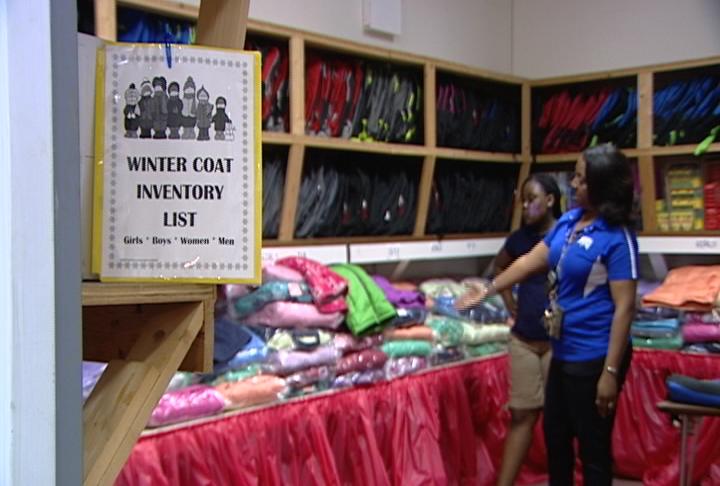Delaware stocks ‘basic needs closets’ at 45 high-poverty schools

Warner Elementary School Principal Chrishaun Fitzgerald (foreground) gives students backpacks, coats and other items from a basic needs closet at her high-poverty Wilmington school. (Dan Rosenthal/WHYY)
Delaware is coordinating with educators, businesses, healthcare institutions and nonprofits to stock “basic needs closets” at 45 high-poverty elementary and middle schools.
The closets will be stocked with student supplies, books, clothes, hygiene products and more. Students can discreetly access the closets during the school year.
The program is yet another one aimed at reducing Delaware’s glaring achievement gap between low-income public school students and those of means.
For example, 35 percent of low-income eighth-graders were proficient in the 2016-17 school year in English, compared with 61 percent of other students. In math, only 13 percent of low-income high school students who took the Scholastic Aptitude Test were proficient in math, compared with 34 percent of other students.
Gov. John Carney announced the initiative Thursday as he toured three schools – one in each county – that will benefit from the contributions.
The state’s partners include Christiana Care, Bayhealth, Nemours, Nanticoke, and Beebe health systems, as well as Incyte, Cover Rossiter, EDiS, and Drinker Biddle. Delaware partnered with the nonprofit First Book to buy products at a reduced rate.
Delawareans can visit www.de.gov/schoolclosets to learn how to help.
State Education Secretary Susan Bunting, whose office is supporting the program, said “disadvantaged students benefit academically when their basic needs are met.”
Dorrell Green, director of the state’s new Office of Innovation and Improvement that will target such schools, especially those in Wilmington, said the effort bolsters his mission “to determine school needs and then coordinate supports and resources for students and families so that all students can come to school ready to learn.”
Dan Shelton, superintendent of the Capital School District in the Dover area, echoed other district leaders in applauding the partnership.
“One of the biggest challenges we face in education is children coming to school unprepared to succeed academically,” Shelton said. “When we can address the immediate concerns first, we give students a greater opportunity to learn and, in turn, provide our teachers with better classroom environments that help every student.”
Kyle Zimmer, CEO of First Book, said his agency is delighted to participate.
“When kids lack the most basic needs, including clothing and hygiene, their self-esteem and school attendance suffers,” Zimmer said. “Heroic teachers try to bridge the gap in resources — but the need is too great.”
WHYY is your source for fact-based, in-depth journalism and information. As a nonprofit organization, we rely on financial support from readers like you. Please give today.




